(完整)六年级一般过去时.doc
六年级英语Therebe句型的一般过去时
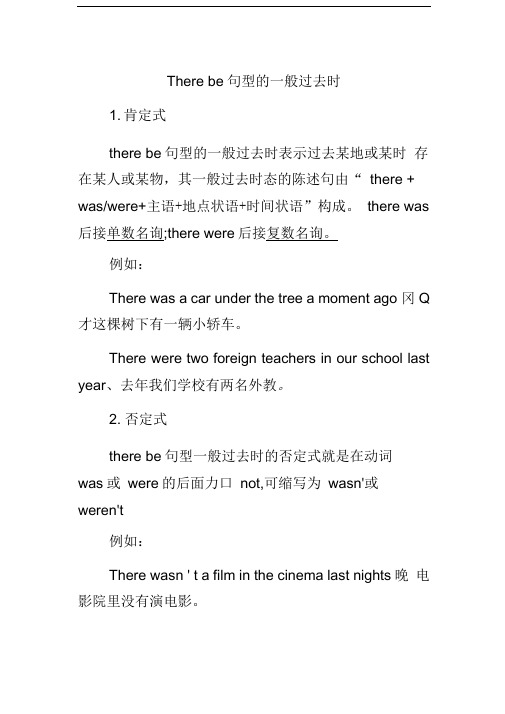
There be句型的一般过去时1. 肯定式there be句型的一般过去时表示过去某地或某时存在某人或某物,其一般过去时态的陈述句由“ there + was/were+主语+地点状语+时间状语”构成。
there was 后接单数名询;there were后接复数名询。
例如:There was a car under the tree a moment ago 冈Q 才这棵树下有一辆小轿车。
There were two foreign teachers in our school last year、去年我们学校有两名外教。
2. 否定式there be句型一般过去时的否定式就是在动词was或were的后面力口not,可缩写为wasn'或weren't例如:There wasn ' t a film in the cinema last nights晚电影院里没有演电影。
There weren ' t any women doctors the挡时没有女大夫。
3. 一般疑问式及其回答there be句型一般过去时的一般疑问式就是将动词was或were放在there之前。
肯定回答用“Yes, thre was/were、;否定回答用“No, there wasr^ ' t weren '、t”。
例如:①一Was there a man in the room just now?冈Q 才房间里有位男子不?—Yes, there was 就是的,有一位。
②一Were there any girl singers in your class last year?去年您们班有女歌手不?—No, there weren、' 不,没有。
4. 特殊疑问式及其回答there be句型一般过去时的特殊疑问式由“疑问词+ was/were+ there+地点状语+时间状语”构成, 有时地点状语与时间状语可省略。
一般过去时(讲义)-人教PEP版英语六年级下册
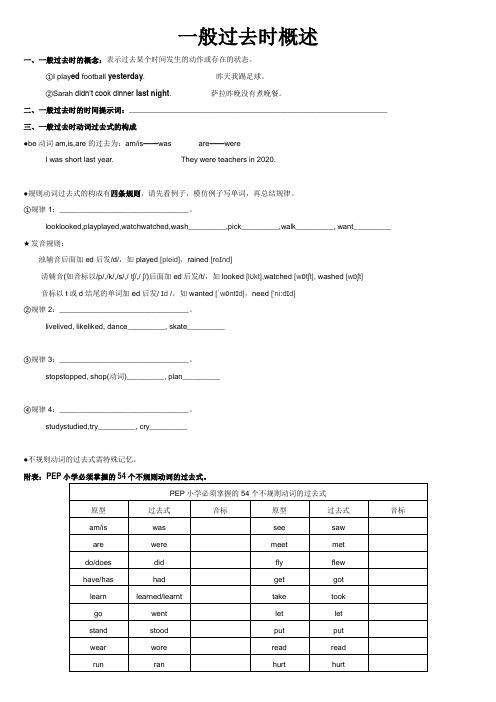
一般过去时概述一、一般过去时的概念:表示过去某个时间发生的动作或存在的状态。
①I play ed football yesterday. 昨天我踢足球。
②Sarah didn’t cook dinner last night. 萨拉昨晚没有煮晚餐。
二、一般过去时的时间提示词:______________________________________________________________三、一般过去时动词过去式的构成●be动词am,is,are的过去为:am/is——was are——wereI was short last year. They were teachers in 2020.●规则动词过去式的构成有四条规则,请先看例子,模仿例子写单词,再总结规律。
①规律1:_______________________________。
looklooked,playplayed,watchwatched,wash_________,pick_________,walk_________, want_________ ★发音规则:浊辅音后面加ed后发/d/,如played [pleid],rained [reɪnd]清辅音(如音标以/p/,/k/,/s/,/ tʃ/,/ʃ/)后面加ed后发/t/,如looked [lʊkt],watched [wɒtʃt], washed [wɒʃt]音标以t或d结尾的单词加ed后发/ɪd /,如wanted [ˈwɒntɪd],need ['ni:dɪd]②规律2:_______________________________。
livelived, likeliked, dance_________, skate_________③规律3:_______________________________。
stopstopped, shop(动词)_________, plan_________④规律4:_______________________________。
外研社(三起)小学英语六年级下册一般过去时

Infinitive am / is are begin break bring build buy can
常见不规则动词
Past tense was were began broke brought built bought could
__D_i_d__ he __f_in_d_ ___a_n_y_ meat in the fridge?
3. She stayed there for a week.(对画线部分提问)
__H_o_w__ __lo_n_g__ __d_id__ she _s_t_ay__ there?Leabharlann That’s great!
1. Xiao Lin went fishing this morning.(改为一般疑问句) 2. We visited our teacher last night.(就画线部分提问) 3. He had lunch at school.(改为否定句) 4. There was some milk in the bottle. (就画线部分提问) 5. He went to that city with his uncle. (改为一般疑问句)
行为动词的一般过去式: a. 规则动词的变化规则: (1)一般动词直接加-ed (2)以e结尾的动词直接加-d (3)以辅音字母加y结尾的词,变y为i再加-ed (4)以重读闭音节结尾,词尾只有一个辅音字母,双写辅音字母加-ed
注:规则动词过去式的发音: 在清辅音后读/t/,在元音和浊辅音后读/d/,在辅音/t/,/d/后读 /id/。 b. 不规则动词变化需参看不规则动词表逐一熟记。
Exercise
按要求完成下列句子。
1. Lucy did her homework at home.(改为否定句)
一般过去时 六年级英语知识点

一般过去时六年级英语知识点一般过去时是表示过去某个时间发生的动作或存在的状态的时态。
例如,昨天她吃了三个苹果,我昨天6:30起床,我父亲上周很忙。
它也可以表示过去经常或过去反复发生的动作,常与often、always等频率副词连用。
例如,年轻的时候,他每天总是起得很早。
谓语形式是动词的过去式。
例如,两年前她是一个学生,这件事情已经过去了,所以be动词is要用过去式was。
另外,两年前他们/她们是学生,安昨晚洗了她的衣服,我及时地完成了作业,这些动词都要用过去式。
句子结构包括be动词的过去式句型和动词过去式句型。
在be动词的过去式句型中,肯定句的结构是主语+be动词(was,were)+其他,例如,两年前她是一个学生。
否定句的结构是主语+be not(was not,were not)+其他,例如,两年前她不是一个学生。
一般疑问句的结构是Be动词(Was/Were)+主语+其他?例如,两年前她是一个学生吗?肯定回答为“Yes,主语+was/were”,否定回答为“No,主语+___”。
特殊疑问句的结构是特殊疑问词+一般疑问句(顺序)?例如,她两年前是什么职业?Where were you yesterday。
I was at home.In the past tense。
there are three types of sentences: affirmative。
negative。
___ the structure of subject + past tense verb + other words。
For example。
"___ the structure of subject + did not + base form of verb + other words。
For example。
"She did not eat three ___ the structure of did + subject + base form of verb + other words + n mark。
(word完整版)小学六年级一般过去时练习题及答案
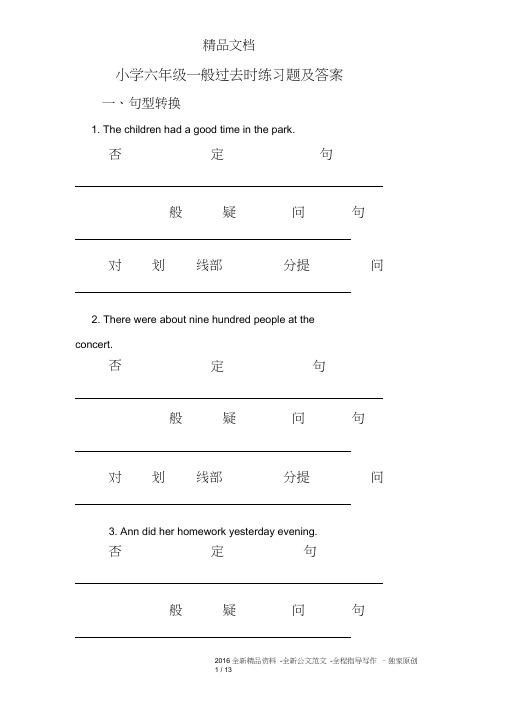
jeθX
jseη- <zeuιq□ OJnoXuθq∕√∖- Z
MOU JSnf noX」Oj IIeo OllOIIdo冋eaιoι∣丄-g
XepjθtsθX ψo∕v∖θs noι∣」θqjouu X∣∕∖∣g
jbθXJSeI eseuiqo ILleOl OJUJOIP
ει/9
■ 6uιueθ∣□ UJe o ueθ∣□ gpeueep V XePUnS
ISel
UJOOJ
XUJ
CP!P
OSooP a OP∀ePuθ>∣θθmISel OP科!∣∕∖∣疋Ψ∖ΛZ
6uiujoluXepjθjsθX OSOuJnOuJOS日Mo」」oluoiV
sjθmo∣)θq;pθjθjbmOlIS ' L
XepjθjsθX ψθMθsnoq
I-<i Xepι∣oq」no人UO oB noXθJθq∕√∖-,
t≡⅜≡≡ Al
哥!”tωeMStoιtθqιtpuetθqtθ>∣e∣i0}u∖
tθqitpθdωnf
o”!qtetψedtXqtoV∏uθM-
JSeltpuθ>∣θθMtΛitpiptuqo∏tIPlE ∕w
8
.He wait for you
three
hours
ago.
9
.Who find
it
just
now?
II.
翻
译下列句子
1.我过了一个忙碌但却刺激的周末
精品文档
but exciting weekend.
2.上周六他们做什么了?他们做作业和购物了。
小学六年级英语一般过去时.docx

第十七讲一般过去时一.概念一般过去时表示过去某个时间发生的动作或存在的状态,常和表示过去的时间状语连用。
一般过去时也表示过去经常或反复发生的动作。
例句:1.I watched TV last night.我昨天晚上看电视。
2.What did you do yesterday?你昨天做了什么3.They went to Beijing last year.他们去年去了北京。
二.用法1.表示过去发生的动作或状态,通常会有明确的表示过去的时间状语。
I went to the zoo yesterday.I stayed up last night.2.叙述过去连续发生的动作或状态。
This morning , I got up early , went out for a walk , then came back and cooked formy family .3.表示过去某一段不确定的时间内发生的动作或状态。
He worked in the store for 5 years.三. Be 动词在一般过去时中的变化1. am 和 is 在一般过去时中变为was。
(was not=wasn't )2. are 在一般过去时中变为were。
( were not=weren't )3. 带有 was 或 were 的句子,其否定、疑问的变化和 is, am, are 一样,即否定句在 was 或 were 后加not ,一般疑问句把 was 或 were 调到句首。
四.句中没有be 动词的一般过去时的句子1.否定句: didn't + 动词原形,如:Jim didn't go home yesterday.2.一般疑问句:在句首加did,句子中的动词过去式变回原形。
如:Did Jim go home yesterday?3.特殊疑问句:疑问词+一般疑问句如:What did Jim do yesterday?五.动词过去式变化规则1.一般在动词末尾加-ed,如: pull-pulled, cook-cooked2.结尾是 e 加d,如:taste-tasted3.末尾是辅音字母加一个元音字母和一个辅音字母的重读闭音节,应双写末尾的辅音字母,再加 -ed,如: stop-stopped4.以“辅音字母+y ”结尾的,变y 为 i,再加 -ed,如:study-studied六.真题再现() 1. The boy the tree last week.A. is wateringB. watersC. watered2. I _____(see) his name in the newspaper yesterday.因为句中出现了表示过去的时间状语last week 和 yesterday ,所以正确答案分别为: 1. C 2.saw精点精练一、用动词的适当形式填空。
闽教版小学英语六年级三大时态(一般现在时、一般过去时、一般将来时..
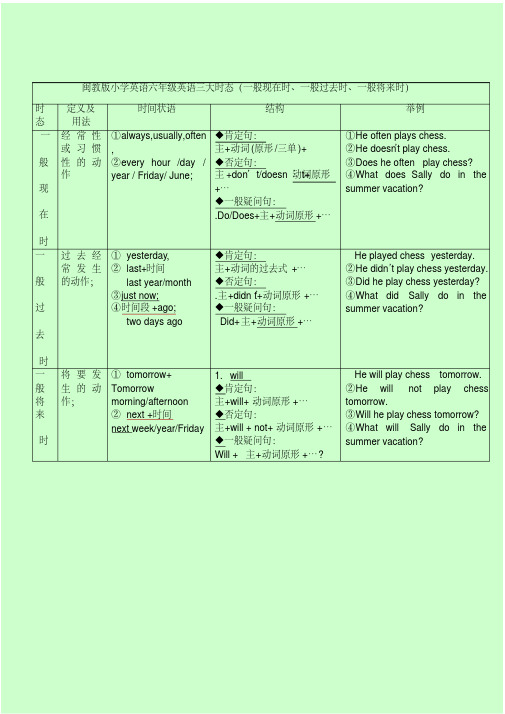
闽教版小学英语六年级英语三大时态(一般现在时、一般过去时、一般将来时)时态定义及用法时间状语结构举例一般现在时经常性或习惯性的动作①always,usually,often,②every hour /day /year / Friday/ June;◆肯定句:主+动词(原形/三单)+◆否定句:主+don’t/doesn’t+动词原形+…◆一般疑问句:.Do/Does+主+动词原形+…①He often plays chess.②He doesn’t play chess.③Does he often play chess?④What does Sally do in thesummer vacation?一般过去时过去经常发生的动作;①yesterday,②last+时间last year/month③just now;④时间段+ago;two days ago◆肯定句:主+动词的过去式+…◆否定句:.主+didn’t+动词原形+…◆一般疑问句:Did+主+动词原形+…He played chess yesterday.②He didn’t play chess yesterday.③Did he play chess yesterday?④What did Sally do in thesummer vacation?一般将来时将要发生的动作;①tomorrow+Tomorrowmorning/afternoon②next +时间next week/year/Friday1.will◆肯定句:主+will+动词原形+…◆否定句:主+will + not+动词原形+…◆一般疑问句:Will + 主+动词原形+…?He will play chess tomorrow.②He will not play chesstomorrow.③Will he play chess tomorrow?④What will Sally do in thesummer vacation?一、选择题( ) 1.Ben usually at 6:40. A.got up B.get up C.gets up ( ) 2.In the past my mother my bed. A.make B.made C.makes ( ) 3.Where you in the summer vacation?A.areB.isC.were( ) 4.Did you a good time in the USA?’tA.have; Yes,I didB.had; Yes,I didC.have; No,I don( ) 5.Do you often do housework at home?A.Yes,I does.B.No,I don’t.C.Yes,I am.( ) 6.Does he clean his room now?’t.A.Yes,she does.B.Yes,he does.C.No,he don( ) 7.li Hong usually at 6:30 in the morning.But this morning she at 7:00.A. get;gotB. gets;getC.gets;got( ) 8. How Mike go to school every day?A.doB.isC.doesD.are( ) 9. The students the football match now.A.watchB.to watchC.are watchingD.watching( ) 10. Did you your room yesterday?A.cleanB.cleansC. cleanedD.cleaning二、填空题1.Listen,there are many students (sing)in the classroom.2.. Look! Sarah is (dance).3. My mother often (wash)clothes on the weekends.4. He (buy) a present for his mother yesterday.5. John (visit)Qingdao next Sunday.6.He usually____(go) to school on foot.7.Does she_____(go) to school on foot?8.Did she ____(go) to school on foot?9.They_____(go) to school on foot yesterday.10.____ she going to school on foot?助动词do,does,did或者它们的否定形式的使用1) you like this magazine?2) The girl like bread for breakfast.3) ---What she at the weekends?---She usually plays games with her friends.4) ---What you do last Sunday? ---I wrote to my friend.5) -- He not visit a farm last National Day holiday.6) They not like playing volleyball.7) --- Jim have a picnic with his family every Saturday?---Yes, he8) Helen with Yang Ling go to school by bike every day? 9) [Do/Does]______ you go to school everyday? No, I don’t. 10) [Do/Does]______ Jack and Peter like apples?11)[Do/Does]______ he watch TV at night? Yes he does. 三.连词成句(请注意大小写)1. the summer you where were in vacation2.did do yesterday what youA good did have time the you in a4. Wang Tao his yesterday did make bed?5. does often housework home Sally at do6.will where you for the go holidays7. to bookstore yesterday he went the.。
小升初复习 一般将来时 一般过去时(素材)通用版英语六年级下册
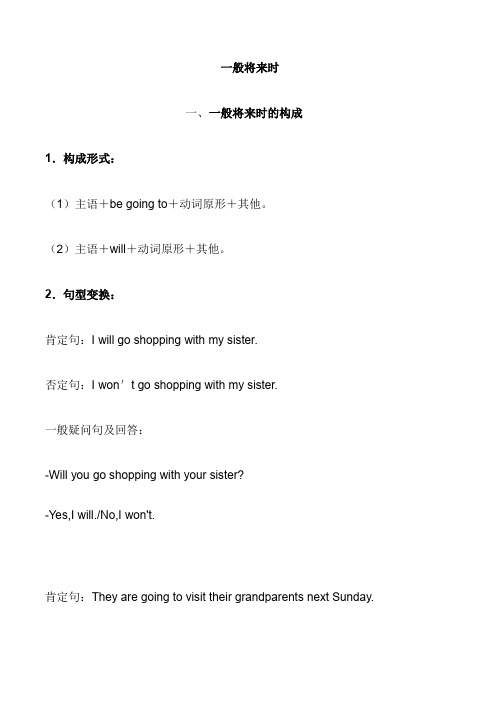
一般将来时一、一般将来时的构成1.构成形式:(1)主语+be going to+动词原形+其他。
(2)主语+will+动词原形+其他。
2.句型变换:肯定句:I will go shopping with my sister.否定句:I won't go shopping with my sister.一般疑问句及回答:-Will you go shopping with your sister?-Yes,I will./No,I won't.肯定句:They are going to visit their grandparents next Sunday.否定句:They aren’t going to visit their grandparents next Sunday.一般疑问句及回答:-Are they going to visit their grandparents next Sunday?-Yes,they are./No,they aren't.二、一般将来时的用法一般将来时表示将来某一时刻将要发生的动作或状态,成未来某一段时间内经常性的动作成状态,常与表示将来的时间状语连用,如:tomorrow,the day after tomorrow,soon,next week/month/year,in the future,from now on,in a few minutes/hours/days等。
1.表示将来某一时刻即将发生的动作或状态,通常与一些明确表示将来的时间状语连用。
如:They will play football next weekend. 他们将在下周末踢足球。
I will go with you tomorrow. 我明天将跟你走。
2.表示将来经常发生的动作。
如:I will often send you E-mail during summer holiday. 暑假期间我将经常给你发电子邮件。
- 1、下载文档前请自行甄别文档内容的完整性,平台不提供额外的编辑、内容补充、找答案等附加服务。
- 2、"仅部分预览"的文档,不可在线预览部分如存在完整性等问题,可反馈申请退款(可完整预览的文档不适用该条件!)。
- 3、如文档侵犯您的权益,请联系客服反馈,我们会尽快为您处理(人工客服工作时间:9:00-18:30)。
一般过去时教学重点、难点一般过去时动词的变化形式和表示过去时的时间状语教学目标理解一般过去时的定义,掌握动词对应的变化形式。
知识梳理1.一般过去时表示过去某个时间发生的动作或存在的状态,常和表示过去的时间状语连用。
一般过去时也表示过去经常或反复发生的动作。
常用的时间状语:yesterday, just now , a moment ago , last week,last year,last Friday,last National Day holiday,the day beforeyesterday...2. Be 动词在一般过去时中的变化:⑴ am 和 is 在一般过去时中变为was。
( was not=wasn’t)⑵are 在一般过去时中变为 were。
( were not=weren ’t)⑶带有 was 或 were 的句子,其否定、疑问的变化和is, am, are 一样,即否定句在was或 were 后加 not,一般疑问句把was 或 were 调到句首。
3.句中没有be 动词的一般过去时的句子否定句: didn ’t 动+词原形,如: Jim didn ’t go home yesterday.一般疑问句:在句首加did ,句子中的动词过去式变回原形。
如:Did Jim go homeyesterday?特殊疑问句:⑴疑问词+did+ 主语 +动词原形?如:What did Jim do yesterday?⑵疑问词当主语时:疑问词+动词过去式?如:Who went home yesterday?动词过去式变化规则:1.一般在动词末尾加-ed,如: pull-pulled, cook-cooked ,shout-shouted ,point-pointed,2.结尾是 e 加 d,如: taste-tasted , like-liked3.末尾只有一个元音字母和一个辅音字母的重读闭音节,应双写末尾的辅音字母,再加-ed,如: stop-stopped4.以“辅音字母 +y ”结尾的,变y 为 i ,再加 -ed,如: study-studied5.不规则动词过去式:am,is-was, are-were, do-did, see-saw, say-said,give-gave, get-got, go-went, come-came, have-had, eat-ate, take-took, run-ran, sing-sang, put-put, make-made, read-read, write-wrote, draw-drew, drink-drank, fly-flew, ride-rode, speak-spoke,博观而约取,厚积而薄发----- 苏轼未觉池塘春草梦,阶前梧叶已秋声----- 朱熹1耐心细心责任心sweep-swept, swim-swam, sit-sat ,become-became,take-took,can-could,swim-swam, bring-brought,drive-drove典型例题过去时练习:写出下列动词的过去式is\am_________ fly_______ plant________ are ________ drink_________play_______ go________ make ________ does_________ dance________ worry________ ask _____ taste_________ eat__________ draw________put ______ throw________ kick_________ pass_______ do ________Be 动词的过去时练习一、用 be 动词的适当形式填空。
1.I ______ an English teacher now.2.She _______ happy yesterday.3.They _______ glad to see each other last month.4.Helen and Nancy ________ good friends.5.The little dog _____ two years old this year.6.Look, there ________ lots of grapes here.7.There ________ a sign on the chair on Monday.8.Today _____ the second of June. Yesterday ______ the first of June. It _____ ChildrenDay. All the students ______ very excited.当堂检测二、句型转换。
1. There was a car in front of the house just now.否定句: ________________________________________________一般疑问句:____________________________________________肯、否定回答:__________________________________________2.I went to the park last weekend.(改为一般疑问句) ________________________________________________________ (改为否定句)_________________________________________________________三、中译英。
1.我的故事书刚才还在手表旁边。
___________________________________________________________2.他们的外套上个礼拜放在卧室里了。
___________________________________________________________3.一会以前花园里有两只小鸟。
___________________________________________________________行为动词的过去时练习一、用 be 动词的适当形式填空。
1. I ______ (watch) a cartoon on Saturday.博观而约取,厚积而薄发----- 苏轼未觉池塘春草梦,阶前梧叶已秋声----- 朱熹2耐心细心责任心2.Her father _______ (read) a newspaper last night.3.We _________ to zoo yesterday, we _____ to the park. (go)4.______ you _______ (visit) your relatives last Spring Festival?5.______ he _______ (fly) a kite on Sunday? Yes, he ______.6.Gao Shan _______ (pull) up carrots last National Day holiday.7.I ____________ (sweep) the floor yesterday, but my mother ______.8.What ______ she _______ (find) in the garden last morning? She __________ (find) abeautiful butterfly.二、句型转换。
1. They played football in the playground.否定句: ________________________________________________一般疑问句:____________________________________________肯、否定回答:__________________________________________过去时综合练习(1)一、用动词的适当形式填空。
1.It _____ _ (be) Ben ’ s birthday last Friday.2.We all ______ (have) a good time last night.3.He ________ (jump) high on last Sports Day.4.Helen ________ (milk) a cow on Friday.5.She likes ______ newspapers, but she ______ a book yesterday. (read)6.He _______ football now, but they _______ basketball just now. (play)7.Jim ’ s mother _________ (plant) trees just now.8._______ they ________ (sweep) the floor on Sunday? No, they _____.9.I _______ (watch) a cartoon on Monday.10.We ___________ (go) to school on Sunday.过去时综合练习一、用动词的适当形式填空。
1.It _____ (be) the 2nd of November yesterday. Mr White ________ (go) to his officeby car.2.Gao Shan ________ (put) the book on his head a moment ago.3.Don ’ t ______ the house. Mum _______ it yesterday. lean)(c4.What ____ you ______ just now? I _______ some housework. (do)5.They _________ (make) a kite a week ago.6.I want to ______ apples. But my dad _______ all of them last month. (pick)7._______ he ______ the flowers this morning? Yes, he _____. (water)8.She ____ (be) a pretty girl. Look, she _____ (do) Chinese dances.9.The students often _________ (draw) some pictures in the art room.10.What ______ Mike do on the farm? He ________ cows. (milk)二、中译英。
